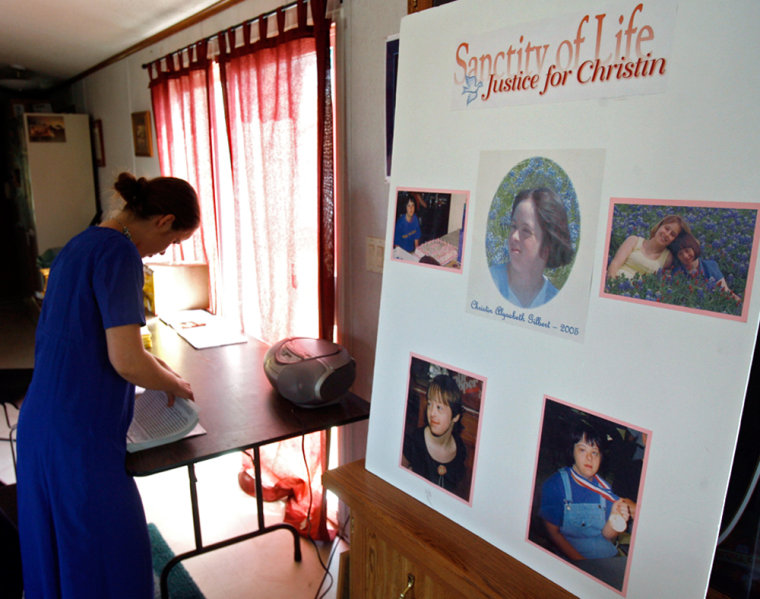Abortion foes are invoking a seldom-used Kansas law to try to force a grand jury to investigate the case of a mentally retarded woman who died after receiving a late-term abortion.
The case represents the latest skirmish over abortion in Kansas, which has become a major battleground, in part because of Dr. George Tiller, one of the few physicians in the country to perform abortions late in pregnancy.
On Friday, abortion opponents plan to present Sedgwick County with a petition signed by nearly 7,000 local residents asking a grand jury to look at the circumstances surrounding the death of Christin Gilbert, a 19-year-old woman from Keller, Texas, whose family brought her to Tiller’s clinic in Wichita for an abortion in January 2005.
Abortion foes want to see Tiller charged with such offenses as involuntary manslaughter, mistreatment of a dependent adult, and failure to report abuse of a child. They contend the woman did not have the mental capacity to consent to either the sex or the abortion.
A 1970 Kansas law allows citizens to call for a grand jury investigation when they feel local law enforcement agencies have failed to act. Kansas is one of the few states with such a law.
“The deeper we looked into this case, the more we realized there was a lack of justice — a travesty that has been committed,” said Troy Newman, president of Operation Rescue in Wichita.
Tiller declined to comment. Julie Burkhart, the spokeswoman for the clinic and director of the abortion rights group ProKanDo in Wichita, had no comment either Wednesday.
Doctor cleared in death
Last year, the Kansas Board of Healing Arts, which regulates doctors, cleared Tiller in Gilbert’s death. While an autopsy listed complications from the abortion as the cause of death, the board concluded neither Tiller nor his staff was responsible.
Anti-abortion groups questioned whether the investigation was thorough because Gov. Kathleen Sebelius appointed many of the board’s members and has received campaign contributions from Tiller and other abortion rights supporters.
“We trust the Board of Healing Arts conducted a thorough investigation in this matter and we have no further comment,” Sebelius spokeswoman Nicole Corcoran said.
Tiller has been the target of protests for years. His clinic was bombed in 1985, and he was shot by a protester in 1993.
Kansas has also become a battleground in recent years because of Kansas Attorney General Phill Kline, a staunch abortion opponent elected in 2002. He is waging a legal battle to look at patient records from two abortion clinics for evidence of misconduct by the clinics as well as child abuse or child rape.
Also, Kline is in the middle of a dispute in federal court for interpreting a Kansas law as requiring doctors, teachers and others to report suspected sexual activity between consenting minors under 16.
Woman died three days after abortion
Gilbert, who had Down Syndrome, was 28 weeks pregnant when her parents took her to the Wichita clinic. She died three days later from an infection. Activists contend proper medical monitoring of the woman’s condition should have found the infection and her worsening condition.
“We are not using her — we are trying to seek justice for her,” said Cheryl Sullenger, an abortion opponent who was at the hospital when the woman was rushed in by ambulance. “She was victimized every step of the way.”
Under state law, a grand jury may be summoned within 60 days after a petition is presented bearing the signatures of slightly more than 2 percent of a county’s registered voters. If the signatures are found to be valid, a judge determines the petition is in proper form, a grand jury can be convened to decide whether to bring criminal charges.
Pornography opponents used the law in Wichita last year to get an indictment against a store selling adult sexual materials.
“It is a great tool,” Newman said. “It gives the ability to citizens to deliver justice when officials aren’t doing their job.”
